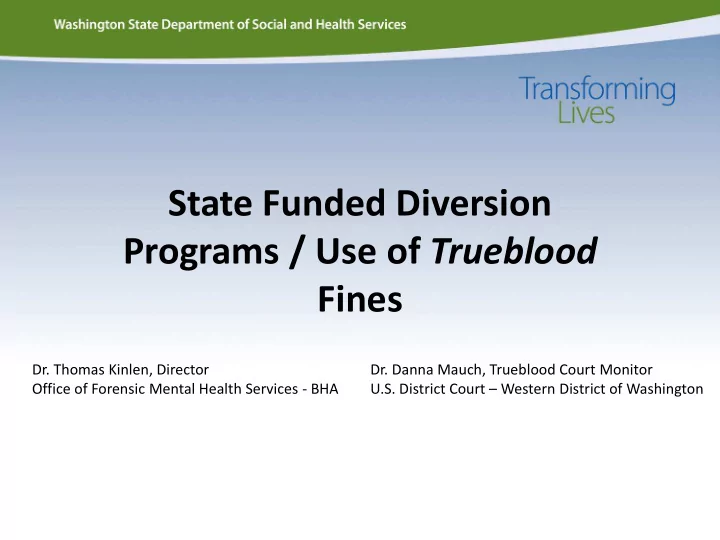

State Funded Diversion Programs / Use of Trueblood Fines Dr. Thomas Kinlen, Director Dr. Danna Mauch, Trueblood Court Monitor Office of Forensic Mental Health Services - BHA U.S. District Court – Western District of Washington
General Overview • Diversion, what is it? • How did we decide the diversion program structure • Two decision points • Workgroup • The Sequential Intercept Model • Trueblood Class member characteristics • State Funded Programs • Trueblood Fine-Funded Programs Cycle of Defendants 2
Diversion: How to re-direct patient flow Diversion from what? • Criminal justice involvement – Arrest – Jail – Prison • Admission to ER’s • Admission to State Hospitals Purpose/Goals of Diversion • Right services at the right time in the best place • Prevent recidivism • Reduce competency services • Reduce long-term incarceration • Collaboration 3
Diversion (Sequential) Intercept Model (Munetz & Griffin, 2006) 4
Class Member Characteristics from July 2016 Data 30% had at least one arrest in the prior year (46% had at least two 21% were Less than 10% arrests) unstably had received housed or substance homeless at abuse the time of treatment the arrest 54% had a 43% were substance Medicaid abuse eligible diagnosis 62% received outpatient mental health treatment that year Data Source: DSHS BHA-DSE 5 Date: July 2016
Diversion funding—two current streams State funded prosecutorial diversion—funded in • SSB5177 $1.394 million GF-S per fiscal year Trueblood Contempt fines assessed beginning July 8, • 2016—Court ordered fines be used to fund diversion programs Phase I: $4.273 million Phase II: $4.557 million 6
Workgroup Workgroup convened to include experts on diversion and • the Court Monitor, Dr. Mauch 6 Strategies Recommended: • 1. Housing Subsidies (Intercept 5) 2. Outpatient Competency Restoration (Intercept 2) 3. Law Enforcement CIT plus (Intercept 1) 4. Pre-screening to triage class members (Intercept 2) 5. Warm handoff re-entry (Intercept 4) 6. Telepsychiatry/medicine (Intercept 3) 7
State-funded Diversion Pilot Programs Targets prosecutorial diversion (Intercept 2) • Prosecutorial diversion allows a prosecutor to use their • discretion to dismiss a non-felony charge without prejudice if the issue of competency is raised. The intent of the program is to divert misdemeanor and low level felony defendants from incarceration and hospitalization, into needed behavioral health treatment. 8
State-funded Diversion Pilot Programs Number Served through Project Desired Outcomes Start Date Services Provided November 30, 2017 Spokane County – program - Reduction in arrests/convictions October, 2016 Liaising with prosecutors office, pre-trail 47 focused on those with - Reduction in competency evaluation services and jail; assessment and referral; misdemeanor and low-level referrals care management, med felonies - Successful completion of diversion management/monitoring; intensive requirements supports - Housing stability Pacific County- program focused - Reduction in arrests/convictions September, 2016 Liaising with prosecutors office and jail; 6 on misdemeanors - Reduction in competency evaluation care management, med referrals management/monitoring; intensive - Successful completion of diversion supports; peer support requirements - Housing stability King County- program focused on - Reduction in arrests/convictions January, 2017 Liaising with prosecutors office; care 31 misdemeanors and low-level - Reduction in competency evaluation management, med felonies referrals management/monitoring; intensive - Successful completion of diversion supports; respite beds; day support requirements - Housing stability Greater Columbia- program - Reduction in arrests/convictions November, 2016 Liaising with the prosecutor’s office and 49 focused on misdemeanors - Reduction in competency evaluation jail; MH assessment and treatment referrals planning while in jail; initial and ongoing - Successful completion of diversion care coordination post release for up to requirements one year (med management, SUD - Housing stability treatment, crisis intervention; limited capacity for housing) 9
Trueblood Fine-funded Programs Phase I (Intercepts 2 and 4) Phase II (Intercepts 2 and 4) • Programs awarded funding • Programs awarded funding beginning 7/1/2017 12/2017 – King County, BHO – Catholic Charities – Sunrise Services, Inc. – Pierce County – Comprehensive Health Care – Thurston Mason BHO – Great Rivers BHO – Kitsap Mental Health Services NOTE: Phase III (Intercepts 1 and 5) was released in October 2017 and application submissions are due December 22, 2017 10
Recommend
More recommend